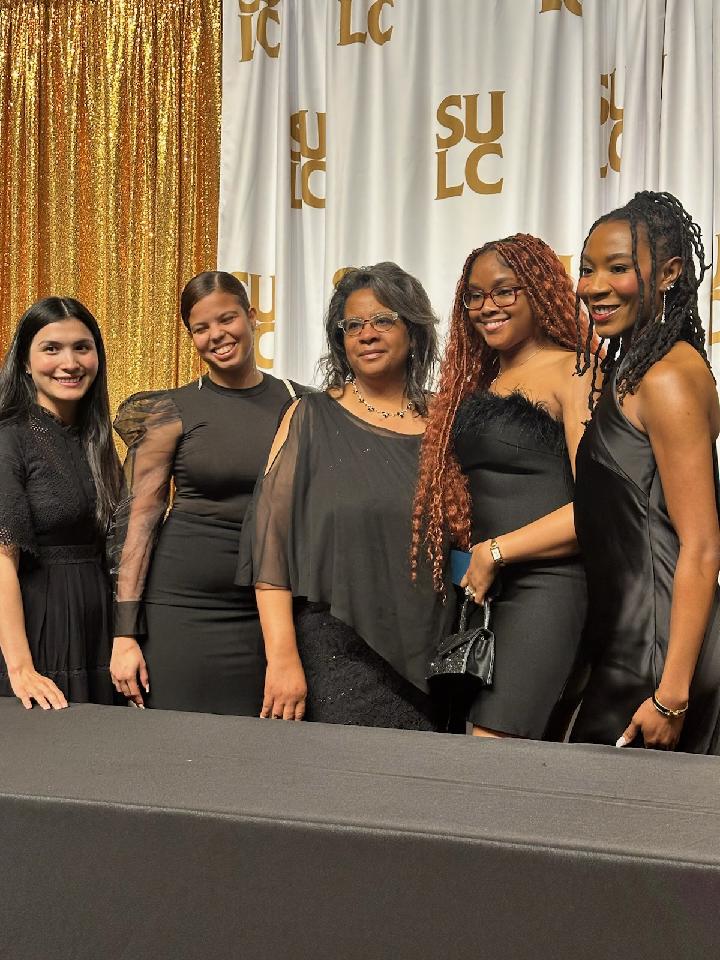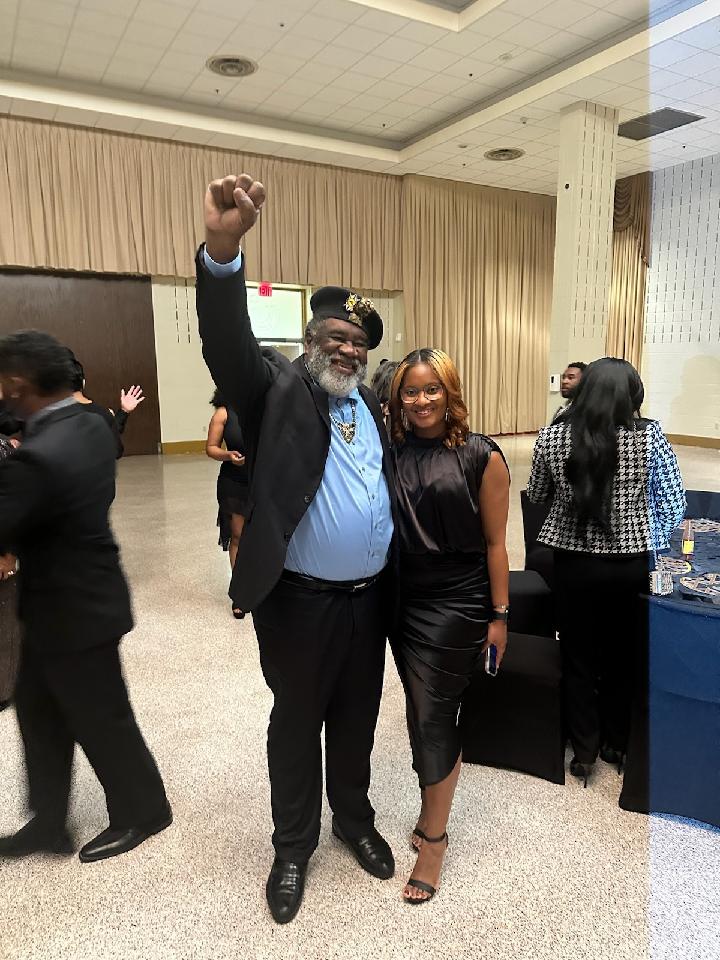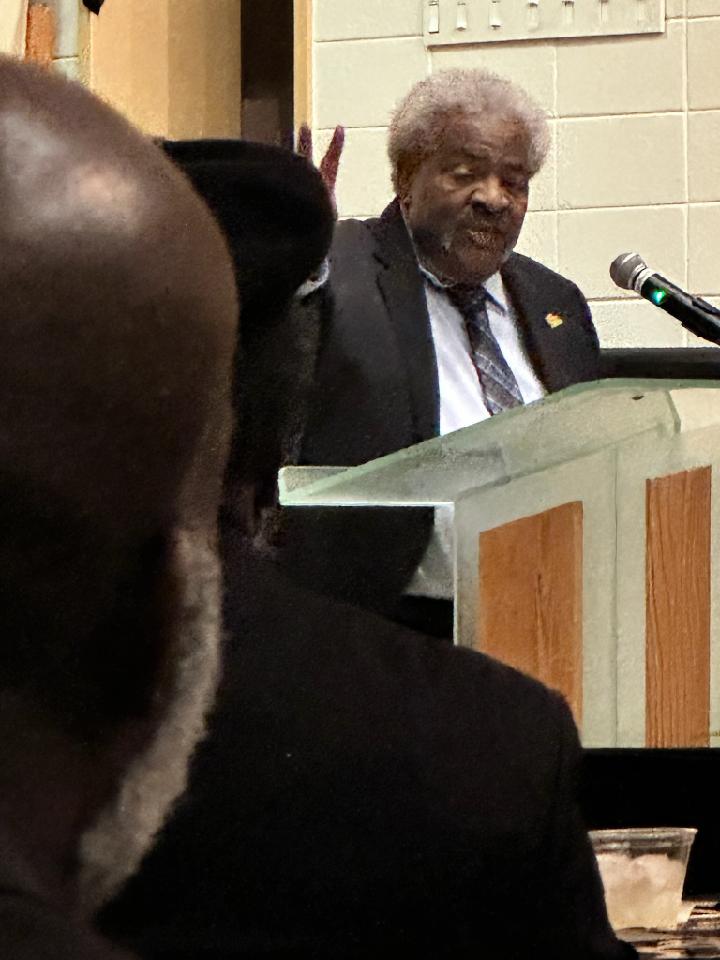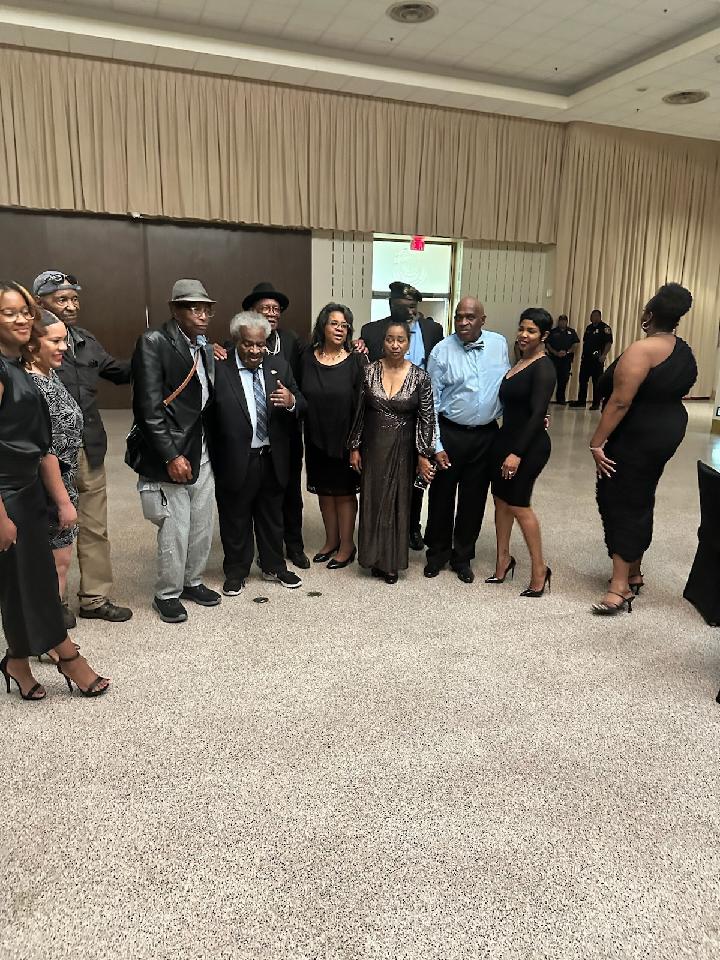The Black Law Students Association’s Southern University Law Center Chapter honored Civil Rights Attorney Ernest L. Jones and the Black Panther Party’s New Orleans Chapter at its Inaugural Awards Gala on February 23.
“BLSA recognized Attorney Ernest Jones with the Lifetime Achievement Award and the Black Panther Party with the Agents of Change Award because of their commitment to advancing civil rights and advocating for the advancement of our people,” said BLSA President Qwantaria Russell, an SULC student.
The aspiring lawyers wanted to do something special during Black History Month. So Professor Angela A. Allen-Bell, the B. K. Agnihotri Endowed Professor at Southern University Law Center, told students about several local attorneys and organizations.
HONORING ATTY. ERNEST JONES & BLACK PANTHER PARTY
“I told them about Attorney Ernest Jones and his legendary work with the Black Panthers. Skilled in representing the BPP Jones got justice for them against the police,” Allen-Bell explains.
The professor marveled at the fact that Jones had graduated from Howard University Law School the year before he took the case of 12 BBP members engaged in a shootout with New Orleans police on September 15, 1970. “He was a baby lawyer,” Allen-Bell says.
“The Panthers did something unprecedented. They turned violent communities into safe communities. They were ambassadors in educating our people and teaching them. And they created a template for education, discipline, and healthy living,” says Allen-Bell. She also pointed out that the BBP’s founders Huey P. Newton and Robert George “Bobby” Seale created “a movement born from a place of academic interests.
Newton attended Merritt College in San Francisco Law School, and the University of California, Santa Cruz (BA, MA, PhD). Seale attended Merritt Community College, where he studied engineering and politics.
HONORING ATTY. ERNEST JONES & BLACK PANTHER PARTY
Professor Allen-Bell is a civil rights attorney. She teaches Criminal Procedure, Constitutional Law, Law and Racism, and Human Rights and Civil Rights at Southern University Law Center.
She worked on the Angola Three case and is one of the lawyers responsible for overturning Louisiana’s nonunanimous jury law.

“Attorney Jones served as a judge, law professor, and in-house counsel for the Black Organization of Police. And he represented CORE (Congress of Racial Equality), Republic of New Africa, The Black Panthers, NAACP, New Orleans Parish School Board, and the AALP (African American Leadership Project), among others,” Allen-Bell told the audience.
After graduating from law school Jones lived in DC for nearly a decade. After that Jomes accepted a community lawyer fellowship at NOLAC (New Orleans Legal Assistance Corporation) doing “anti-poverty” work. Shortly thereafter, he met Green Stevens Jr., aka Steve Green.
Stevens founded the National Committee to Combat Fascism (NCCF) in New Orleans. It was always the Black Panther Party,” Stevens says, but he explains that “The NCCF name was used to avoid infiltration of the group by people posing as BPP members.”
“I was a member of the national BPP and the co-founder of the Riverside, California Chapter,” Stevens explains. He was living in Compton, California, when Elmer “Geronimo” Pratt, aka Geronimo Ji-Jaga, originally from Morgan City, recruited him to join the BPP.
HONORING ATTY. ERNEST JONES & BLACK PANTHER PARTY
Sensing a need for the BPP in New Orleans, Stevens returned “home” in 1970.He launched the NCCF. Stevens says the local group started a breakfast program, afterschool programs, political awareness campaigns, and anti-drug programs. “We ran the drug dealers out of the Desire neighborhood.”
Stevens was in New York with Huey Newton when the September 15 shootout between the BBP and NOPD occurred. Newton advised him to go to San Francisco to avoid extradition to New Orleans. In New Orleans, police charge BPP members with criminal anarchy.
He resigned from the BPP in 1970 after learning of the assassinations of BPP officials. “Sam Napier and his wife were assassinated,” Stevens says. Napier was the national distribution manager for the Panther newspaper.
Under Director J. Edgar Hoover, the FBI’s COINTELPRO (Counterintelligence Program) launched in 1956 to undermine the Communist Party in the United States. But in the 1960s and 1970s, Hoover investigated and disrupted black leaders and black-led organizations.
On June 15, 1969, FBI Director J. Edgar Hoover declared, “The Black Panther Party, without question, represents the greatest threat to the internal security of the country.” He pledged that 1969 would be the last year of the Party’s existence, PBS reported.
HONORING ATTY. ERNEST JONES & BLACK PANTHER PARTY
Under his COINTELPRO, Hoover targeted Malcolm X, Dr. Martin Luther King Jr., Stokely Carmichael, H. Rap Brown, Elijah Muhammad, black celebrities, and the Black Panther Party.
The FBI’s counterintelligence methods included sending undercover agents into the Black Panther Party. After they infiltrated the organization, they committed criminal acts. In fact, these infiltrators originated almost all of the violence that the public associated with the Panthers.
Even worse the FBI misled local police. Aided by an FBI informant, Chicago police murdered Illinois Black Panther leaders Fred Hampton and Mark Clark in 1969. And Oakland police murdered Bobby Hutton in 1968. FBI records acquired by the UC Berkeley Library reveal the FBI created violence and framed Black leaders and civil rights organizations.
Estimates are that COINTELPRO and the police officers working as part of the program killed 28 Black Panther Party members and imprisoned another 750 in their effort to destroy the group.
“We had some (infiltrators) in our chapter in New Orleans, too,” Stevens affirms, naming police officer Israel Fields.
HONORING ATTY. ERNEST JONES & BLACK PANTHER PARTY
Stevens retained Attorney Jones’ services because “I knew we would be arrested.” Faced with eviction from their St. Thomas office, Attorney Jones represented them.
“We won that case, but a compromise was reached. The NCCF would stay there a while longer but vacate later,” says Jones.
The NCCF launched the Feed the Children program. They also helped older people, held political education seminars. The group conducted armed patrols and taught the area’s residents self-defense. Most importantly, they ran drug dealers out of their community.
On September 15, 1970, at least 100 police descended on the BBP’s headquarters on Piety Street (at a house owned by a store owner). The cops fired hundreds of rounds of bullets,” Jones recalls.
“The Black Panther Party was named the Black Panther Party for Self-Defense. And one of the party principles was that they would defend themselves if attacked,” Jones said. “And so, they were prepared to do that.”
The Panthers fired back but police outgunned them. Police lobbed 30 rounds of tear gas and brought 240 weapons to the shootout, including AR-15s. Police arrested sixteen, and charged 12 with attempted murder, one news outlet reported.

Ronald Ailsworth, the co-founder of the NCCF, was at the Piety Street location during the September 15 shootout.
HONORING ATTY. ERNEST JONES & BLACK PANTHER PARTY
“There were 13 of us and one juvenile that day,” Ronald told Think504.com. They shot back. But were no match for the massive police force that bombarded the building with bullets and tear gas. “We weren’t an official BBP chapter until after that day,” Ronald remembers.
“We were all arrested and stayed in jail until the trial.” We stayed locked up for approximately 11 months. “Nobody had money for bail. Everybody was found not guilty but me,” Ronald continues. “I had a simple bank robbery charge.” He was convicted and spent years in a federal prison.
“God was with us and saved us from all those bullets,” Malik Rahim says. He was in the September 15 incident.
Law enforcement officers returned on November 19 with a military tank. Hundreds of cops came from all over the state. But hundreds of community members stood in solidarity with the BPP and between the police and the BPP headquarters. “No shots were fired that day,” Attorney Jones recalls.
Ronald’s wife, Betty Ailsworth, then Betty Powell, was in the second “shoot-in” on Thanksgiving Day, November 26. They were at the Desire public housing apartment when cops dressed as priests knocked on the door at 1:30 a.m. The door opened and, “They came in shooting,” Betty spent a week or two in the hospital. She still carries five pellets in her body. “We call it a shoot-in because we didn’t do any shooting,” Betty attests.
“Betty was unarmed with hands up when she was shot,” Allen-Bell recounts.
“Jane Fonda was in New Orleans for a speaking engagement. She asked how she could help the BPP. The not-arrested members told Fonda they wanted to go to a convention in DC and needed transportation. She rented them a few cars. However, police monitored their every move, and arrested them on the interstate,” Jones tells Think504.com.
Why did the police attack the organization? They (law enforcement) were enthralled with the propaganda that the BBP was a violent, radical, revolutionary group who wanted to kill white cops,” Jones explains.
Attorney Ernest Jones defended 12 BPP members at the trial with Judge Israel Augustine presiding and a predominantly Black jury of their peers. Jones won the case. All 12 walked out of the courtroom as free people. However, Jones paid a heavy price for representing the BPP. NOLAC fired him.
Jones says the most impactful moment of his legal career came “when the white jury foreman in the BPP case stood up and said, “In the name of Martin Luther King, Jr., not guilty.”

“I’ve gotten awards. I got one from the Federal Lawyers, but this Award is special because these are my folks.”
Attorney Ernest Jones while Accepting the Lifetime Achievement Award,
Related: Living Legend Malik Rahim Honored
On the shoulders of this legendary freedom fighter we are all blessed. Today we are stronger. Today we can go forward knowing the path is clear. The great work of Ernest Jones makes our today easier. His challenge to this generation is to keep up the fight. We must continue to press on. We must continue to be vigilant.
“Demographers say this generation feels there aren’t any legal challenges, and they wish they had been around for the Civil Rights Movement. But there are a lot of challenges left for you. My generation got access to voting rights, government positions, and corporate employment. Your generation will have to gain access to America’s wealth,” Jones advises the law students.
Face the challenges of today with the same courage and conviction as attorney Ernest Jones. His example is the template. Do your best everyday. Live each day to the fullest. But fight for the rights of our people. You can and you must.

